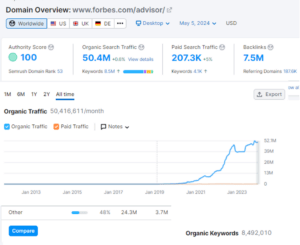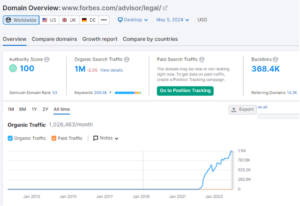When the March 5th Google Update started rolling out, one of the core aspects was “Site Reputation Abuse,” which states the following:
“Sometimes, websites that have their own great content may also host low-quality content provided by third parties with the goal of capitalizing on the hosting site’s strong reputation. For example, a third party might publish payday loan reviews on a trusted educational website to gain ranking benefits from the site. Such content ranking highly on Search can confuse or mislead visitors who may have vastly different expectations for the content on a given website.
We’ll now consider very low-value, third-party content produced primarily for ranking purposes and without close oversight of a website owner to be spam. We’re publishing this policy two months in advance of enforcement on May 5, to give site owners time to make any needed changes.”
SEOs have called this practice “Barnacle SEO” for decades because it is the concept of latching on to an existing, highly authoritative website and leveraging that authority to rank quickly, even if the content and/or keyword isn’t very relevant.
Enter, Forbes and their ongoing Internal Directory / Paid Placement play.
Forbes has been a resource for SEOs, also for decades, because of its high authority and ease of paying-to-play with article submissions on generally anything you want. In fact, we purchased articles on here for our own Thought Leadership on digital marketing 5+ years ago. Occasionally, some of our clients would submit a legal article in order to get some fairly nice backlinks and diversify their link portfolios – this has fallen off more in the past few years because of Forbes being flooded with sponsored articles and the cost being pretty prohibitive (at least $1,000 per article).
And yet, in light of what this website is and the very transparent and easy accessibility of a monetary exchange versus the requirement of high-quality contributions and notoriety, Google has continued to reward the opportunistic machinations of this website, and I’m certain this continues to be pervasive with other websites of similar stature.
It’s May 5th, the rollout is complete, and Forbes is getting more traffic than ever for participating in practices that Google claimed it would eliminate two months ago. Let’s look at some trends to confirm Google’s satisfaction with Forbes’ engagement in marketing practices that were supposedly going to be panelized by now:

First of all, no one can compete with the sheer velocity of millions of links coming in from hundreds of thousands of different websites. Though this section of the website launched around March of 2019, this page and all of the subdirectories (which we’ll get into in a moment) have hit its stride. Do any search on Google for what they provide on their Advisor page – savings accounts, credit cards, insurance, loans, etc. and they’ll likely have a strong presence on the first page.
You may be asking yourself “Well, this page mentions ‘Smart Financial Decisions Made Simple,’” and most everything here concerns personal finance. Forbes has always been a resource for finance, investing, marketing, etc. So, when did it become a coveted resource for legal?

And why does it need an advertising disclosure, compared to the financial hub?


Oh, that’s right, it’s pay to play like everything else. Let’s explore more.
The advertising disclosure says “First, we provide paid placements to advertisers to present their offers. The compensation we receive for those placements affects how and where advertisers’ offers appear on the site. This site does not include all companies or products available within the market.”
This section of the website also launched much later than the other “advisor” hubs, and much like the others, continues to be rewarded, even though legal expertise is a far cry from financial.”

If we continue to navigate this site, we’ll notice the vast majority of the articles are simply “Best (insert type of lawyer) in (city)”. These aren’t articles that are informative or educational – they’re just well optimized directory pages that’s sole purpose is to show up as high as possible in search results, giving exposure of qualified traffic to the lawyers who are paying Forbes the most to show up when traffic that would otherwise go to lawyers’ websites or legal-specific directories is diverted.
Case in point, Google is not enforcing “Site Reputation Abuse” whatsoever on Forbes because all of these articles are arguably “very low-value, third-party content produced primarily for ranking purposes,” and further, likely charging money for the lawyers’ placement on it. Without this becoming slanderous, there are notes on “Why This Attorney Was Chosen,” which most directories don’t have. But if you put those facts up against many other attorneys in their respective area, you’d see they’re oftentimes arguably comparable.
So, What Now?
The main takeaway, besides acknowledging again that Google rarely exhibits the standards it professes so vehemently, is that we should be looking at what Forbes is doing SEO- and content-wise to get so much visibility for these pages. We’ll never be able to compete on the number of backlinks and the force of the brand, but we will be able to employ many of the current trends we’re witnessing on-page in this hub.
Let’s take this page for example and break down what best practices are being employed.

- EEAT Authorship with both a contributor and an editor, with author profile/bios set up
- Updated consistently, with the last update just a few months ago
- Being able to use strong keywords as the title, H1
- Establishing geo specifics in the first paragraph, though we’d prefer to use a better hook and keep this language a little lower in the content. Either way, it is present.
Unlike other directories, there is plenty of language on the page about Car Accident Lawyers, Damage Caps, How to Find a Lawyer, and Methodology. This seems to fulfill Your Money, Your Life (YMYL) aspects of the page. What do we get? A number one ranking for “Best Car Accident Lawyers Austin” and five for “Car Accident Lawyers Austin.” It’s a tricky situation for lawyers that while they want nothing more than to compete and rank for keywords using “best,” they risk admonishment from their bar association for pushing their luck on the ethics of this form of advertisement.
There are only two forms of Schema on this page: NewsArticle and FAQPage. This information is on the backend and tells Google additional information about the page without bogging down the user. At Market My Market, we love seeing the clever ways SEOs utilize Schema for getting an edge in search results. These pages show an Author (the Author mentioned above) and then a Publisher (Forbes). The FAQPage only offers two Questions and Answers. These pages are able to perform well with what I’d argue is a fairly underutilized amount of Schema information.
So, What’s Next?
I’d imagine Forbes will roll out a play for Medical next, and imminently. After all, they have plenty of information on health insurance, and it aligns even closer with what exists than legal did. There are different legal implications of saying “Best” when it comes to doctors, dentists, and specialists than there likely are than lawyers (this I’m not certain about, but I’m confident). The word “Best” is a cornerstone of all of these campaigns working because they know individual providers have tough compliance seas to navigate when they integrate the word in reference to themselves. And people do indeed prepend “best,” “top”, “top-rated,” etc. to their searches. It’s better to get the clear to go with best than launch prematurely without it.
Also, this appears already, though blank, it is not broken. It seems Forbes will solidify its presence post-core update with all the considerations of how they’ve approached this differently from Yelp, Thumbtack, and Expertise in the past (all of the generalized directories).
This could be a great opportunity to be first to market for our medical clients. As much as we’d prefer not to engage with these vendors, this is all marketing, and there are marketing channels. Neglecting to acknowledge them would be a detriment to our clients, and it is our responsibility to be aware of all marketing channels and advise on what would be best at that point in time.
Unlock the Secrets of Google’s SEO Contradictions with Market My Market’s Expertise
As Google’s algorithms evolve, deciphering the truth behind SEO becomes increasingly elusive. Despite Google’s promises to penalize manipulative tactics like “Barnacle SEO,” Forbes continues to flourish with its internal directory and paid placement strategies. At Market My Market, we specialize in unraveling the complexities of SEO, providing invaluable insights into Google’s ever-changing algorithm and equipping you with the tools needed to navigate the digital landscape confidently.
From dissecting Forbes’ SEO tactics to unraveling the intricacies of schema markup, we offer unparalleled expertise to help you stay ahead of the curve. Don’t let Google’s SEO contradictions hinder your online success. Contact Market My Market today at (800) 997-7336 or fill out our contact form to unlock the secrets of SEO and propel your digital strategy to new heights.

The ongoing digital revolution is transforming the way that all businesses interact with clients and customers. Consumers rely heavily on digital channels for researching products and services and expect to make buying choices with the swipe of a finger. For organizations that want to remain competitive, having a defined digital marketing strategy and execution plan is essential for successful outcomes. With a demonstrated history of creating and implementing strategic digital marketing initiatives that drive growth, I am committed to delivering real, measurable results for my clients.


